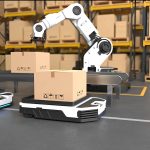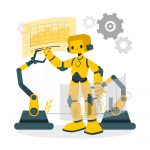With technological advancement, the influence of technology across industrial sectors has grown more than you might think. Robotic Process Automation or RPA is one such promising technology that is being employed in various industries, such as insurance. It has the potential to transform business operations and has become increasingly popular in recent years. A lot of … [Read more...] about 5 Use Cases of RPA in the Insurance Industry
Robotics
Robotics is becoming prevalent in our lives. It's crucial to understand its implications for the future of work. Discover all you need to know about robotics here.
How Robotics is Transforming the Healthcare Industry
Robotic surgery through the use of cutting-edge technology is bound to make a surgeon's job much easier. Moreover, it cannot replace human doctors anytime in the near future for most robotic systems will enhance human capabilities and post-operative outcomes. Artificial intelligence (AI) is an integral part of our everyday life as it makes our life simple and easy since it … [Read more...] about How Robotics is Transforming the Healthcare Industry
How Robots Will Change Organizations
The below is a summary of the original article on how robotics will change business. Robots have rapidly evolved from science fiction concepts to tangible innovations that are revolutionizing various industries. Recent advancements in robotics span industrial automation, human-robot collaboration, robotic surgeries, companionship robots for the elderly, and the development of … [Read more...] about How Robots Will Change Organizations
What is the role of agile robotics automation services in logistics?
Agile Robotics Automation Services In recent times, the logistics industry has undergone a significant transformation through the implementation of agile robotics automation. The logistics industry has experienced rapid growth on a global scale, with an increasing demand for transportation and delivery services that are efficient, cost-effective, and timely. The field of agile … [Read more...] about What is the role of agile robotics automation services in logistics?
The Future is Here: A Comprehensive Guide to Robotics
Robotics has long been a fascination for science fiction enthusiasts, but in recent years, it has become a reality. Today, robots are used in a variety of applications, from manufacturing and healthcare to exploration and entertainment. In this article, we will provide you with a comprehensive guide to the world of robotics, including its history, current applications, and … [Read more...] about The Future is Here: A Comprehensive Guide to Robotics
What is robotics?
Robotics refers to the branch of technology that deals with designing and operating robots. Robotics also deals with artificial intelligence — the ability of machines to carry out tasks that would normally require human intelligence, like understanding natural language and recognizing objects. Want to learn more about robotics? Datafloq has courses available. Contact us to get started.
What are robots used for?
Robots are used in industrial and commercial settings for welding, fabricating, testing, measuring, and inspection. In addition, they can work in dangerous or difficult environments that would otherwise be unsafe for human workers.
At home, robots are commonly used as vacuum cleaners, lawnmowers, and window cleaners. Some more advanced home robot models can also perform complex tasks such as making a bed or folding laundry. As technology continues to evolve, the number and variety of tasks robots can perform will likely continue to grow.
What are the different types of robots?
There are many different types of robots, each designed for a specific purpose. Some robots are designed for manufacturing tasks, such as welding or fabricating parts. Others are for logistics tasks, such as moving materials around a warehouse. There are also robots that are designed for domestic chores like vacuuming or mowing the lawn.
Each type of robot has its strengths and weaknesses, and the right type of robot for a given task will vary depending on the job’s specific requirements. When choosing a robot, it is important to carefully consider the capabilities of each type to ensure that the right tool is selected for the job at hand.
What are the advantages of robots?
Robots have many advantages over human workers. They can work faster, with more precision, and are not affected by environmental conditions. They can work 365 days a year without rest and don’t require breaks or vacations. Additionally, they are not affected by emotions or physical needs, so they can maintain peak performance at all times.
Robots can also be programmed to perform specific tasks, which helps minimize mistakes. Finally, the long-term costs involved with robots are more affordable, as there is no need for health insurance or other benefits. In short, robots offer several advantages over human workers, making them an attractive option for many businesses.
What is the future of robotics?
In the near future, robots will likely become increasingly commonplace in commercial and residential settings. One area where robots are already making an impact is the healthcare industry. Robots are being used to assist surgeons, transport patients, and dispense medication.
They are also being developed to provide companionship and care for the elderly and infirm. As robotics technology continues to advance, the scope of what robots can do is likely to expand even further. Ultimately, the future of robotics will likely be defined by the imagination of those who create them.







